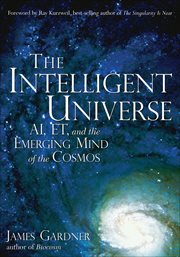Nonfiction
eBook
Details
PUBLISHED
Made available through hoopla
DESCRIPTION
1 online resource
ISBN/ISSN
LANGUAGE
NOTES
What is the ultimate destiny of our universe? That is the striking question addressed by James Gardner in The Intelligent Universe. Traditionally, scientists (and Robert Frost) have offered two bleak answers to this profound issue: fire or ice. In The Intelligent Universe, James Gardner envisions a third dramatic alternative-a final state of the cosmos in which a highly evolved form of group intelligence engineers a cosmic renewal, the birth of a new universe. "Physicist and author Gardner expands on the themes of his 2003 title Biocosm, incorporating concepts of artificial intelligence, non-biological life and the possibility of extra-terrestrial intelligence. It is helpful, but not necessary, to have read Bio "Once again, Gardner takes on the biggest of themes-the function and future of the universe. Could it be that life, a humble bit of dirty chemistry on a tiny planet, is actually the ̀man behind the curtain,' pulling the levers that will actually guide the "Jim Gardner is a man who thinks BIG! And it doesn't come any bigger than the universe itself. This profound meditation on the future of the universe and the central role intelligence plays in that drama will keep you enthralled with the possibility that James Gardner, a well known and widely published complexity theorist, lives in Portland, Oregon. His first book, Biocosm, was selected as one of the ten best science books of 2003 by the editors of Amazon.com and was featured in major stories in TIME, U.S. News & World Report, Harper's, and National Geographic and other major publications. Gardner?s path-breaking scientific articles have appeared in Complexity (the scientific journal of the Santa Fe Institute), Acta Astronautica (the scientific journal of the International Academy of Astronautics), the International Journal of Astrobiology, and the Journal of the British Interplanetary Society. He is a regular lecturer at prominent institutions around the world
Mode of access: World Wide Web







